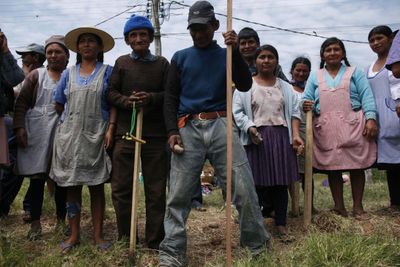Dozens killed amid protests in Bolivia
Pando province under martial law

LA PAZ, Bolivia – President Evo Morales struggled to assert control over a badly fractured Bolivia on Sunday as protesters set fire to a town hall and blockaded highways in opposition-controlled provinces, provoking gasoline and food shortages.
At least 30 people have been killed in the poor Andean nation in the past week, Interior Minister Alfredo Rada said. All the deaths occurred in Pando province, where Morales declared martial law on Friday, dispatching troops and accusing government foes of killing his supporters.
The governor of natural gas-rich Tarija, representing the four eastern provinces that are in rebellion, said before entering talks in the capital Sunday with Morales that half the country was paralyzed by 35 highway blockades.
“Also paralyzed are borders with Argentina, Brazil and Paraguay,” Gov. Mario Cossio said, expressing hope of laying the groundwork for a truce.
South America’s leaders were headed to Chile for an emergency summit today aimed at trying to prevent Bolivia from splintering. Leaders of all the continent’s major nations except Alan Garcia of Peru confirmed their attendance, including Morales.
Government troops continued to arrive in Pando and patrol the streets of its capital, Cobija, and Morales’ chief of staff, Juan Ramon Quintana, sought the arrest of provincial Gov. Leopoldo Fernandez “for violating the constitution and generating the bloody killings of the peasants.”
A day earlier, Morales accused Fernandez of using Peruvian and Brazilian “assassins” in an alleged ambush of government supporters.
Fernandez has denied any involvement in Thursday’s violence, calling it not an ambush but rather an armed clash between rival groups. His security chief, Alberto Murakami, put the death toll at 15.
The gravest challenge to Morales in his nearly 3-year tenure as Bolivia’s first indigenous president stems from his struggle with the four lowland provinces where Bolivia’s natural gas riches are concentrated and where his government has all but lost control. Saboteurs briefly cut some natural gas flow at midweek to Brazil, which depends on Bolivia for half its gas consumption.
The provinces are seeking greater autonomy from Morales’ leftist government and are insisting he cancel a Jan. 25 referendum on a new constitution that would help him centralize power, run for a second consecutive term and transfer fallow terrain to landless peasants. Morales says the new charter is needed to empower Bolivia’s poor indigenous majority.
Morales’ representative in Pando, Nancy Texeira, said the death toll from Thursday’s fighting between pro- and anti-government forces near the town of Porvenir was expected to rise as more dead and wounded were being found.
Morales and his close ally President Hugo Chavez of Venezuela expelled the U.S. ambassadors in their countries last week to protest what they called Washington’s inciting of the protests.